Upgrading and Analyzing Apple's Nehalem Mac Pro
by Anand Lal Shimpi on July 13, 2009 5:00 PM EST- Posted in
- Mac
Performance
Understanding how the new Nehalem Mac Pro performs really isn't that difficult; it all boils down to the type of workload. On very threaded workloads, the new Mac Pro should be much faster than the old one, even at a lower clock speed. Single threaded applications will show us the opposite - the new Mac Pro will need equivalent clock speed to equal the older one. And for everything in between, the wins will vary.
Adobe Photoshop CS4 Performance
To measure performance under Photoshop CS4 we turn to the Retouch Artists’ Speed Test. The test does basic photo editing; there are a couple of color space conversions, many layer creations, color curve adjustment, image and canvas size adjustment, unsharp mask, and finally a gaussian blur performed on the entire image.
The whole process is timed and thanks to the use of Intel's X25-M SSD as our test bed hard drive, performance is far more predictable than back when we used to test on mechanical disks.
Time is reported in seconds and the lower numbers mean better performance. The test is multithreaded and can hit all four cores in a quad-core machine.
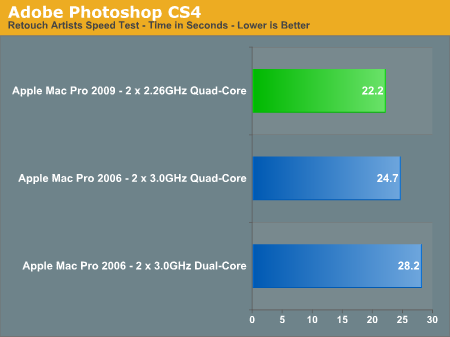
This test isn't heavily threaded from start to finish, some actions only stress one or two cores while others will drive all sixteen virtual threads on the new Mac Pro. The speedup from Hyper Threading is enough however to give the new Mac Pro an advantage, even at a lower clock speed, over the older model. This makes sense given how well the Nehalem based Core i7s do in our CS4 benchmark in Bench.
Apple Aperture 2.1.2 Performance
While Photoshop lets us do a lot of photo processing, Aperture is useful in managing workflow before we get to the heavy processing stages of Photoshop. For this test I'm exporting one of the sample albums that comes with Aperture from RAW to JPEG format.
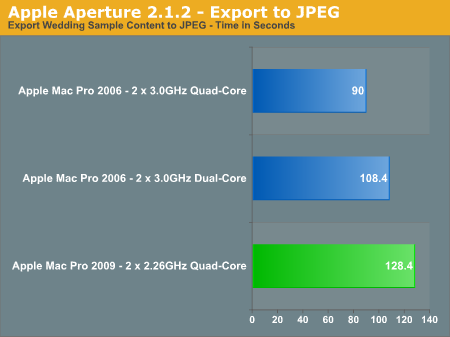
The results here aren't uncommon. In a lightly threaded task you shouldn't expect the new Mac Pro to be faster than the old one, there's no replacement for clock speed. Other workloads will be hurt simply because L2 cache sizes are smaller with Nehalem then they were previously (only 256KB L2 per core with Nehalem).
Xcode Performance
Good compiler tests are hard to come by, but I've found that building the Adium source in Xcode is not only repeatable but a great test of platform performance. The build process is multithreaded and will use up to 16 threads, although not consistently over the course of the build.
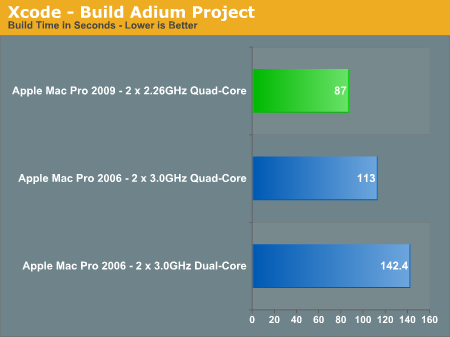
Hyper Threading has the potential to really help the new Mac Pro if you're running a heavily threaded workload. The Xcode test is the perfect example of a real world usage scenario that doesn't max out all cores, but still does very well on the new Mac Pro.
Adobe Premier Pro CS4 Performance
Video encoding under Quicktime was a bust, but using a professional encoder like Premier Pro shows the strength of Nehalem:
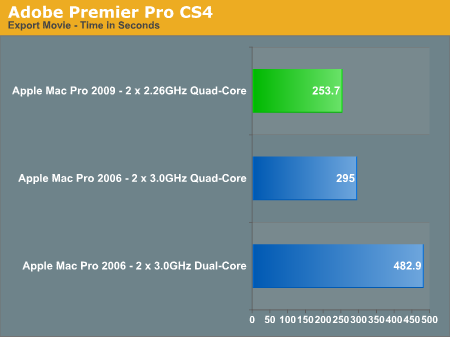
At 2.26GHz we're faster than eight cores running at 3.0GHz with the first Mac Pro. Throw in a pair of 2.93GHz Xeons and you'll see another ~20% performance improvement on top of that.
I would guesstimate that the quad-core 2.66GHz Mac Pro should deliver performance similar to (if not slightly slower than) the older 8-core 3.0GHz Mac Pro.
Quicktime H.264 Encoding Performance
While video encoding can definitely benefit from the monster threading abilities of the new Mac Pro, lighter encoding workloads don't really benefit:
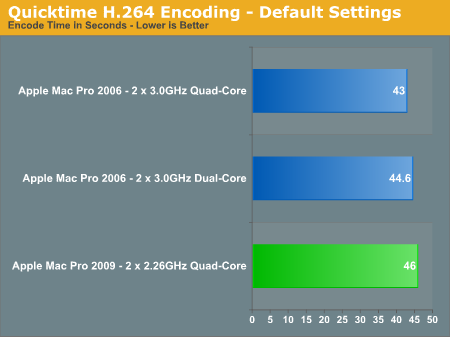
Quicktime is hardly the best application to do serious video encoding, here we see it barely scales beyond two cores - Nehalem has nothing to offer us in this sort of a situation.
iWork, iLife and General Use Performance
If you plan on using your Mac Pro for more than just rendering, encoding and computation, you'll find that it does work very well as a general use machine:
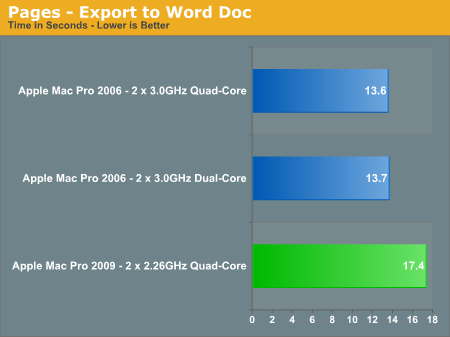
But clock speed definitely matters. In these two iWork benchmarks the 2.26GHz eight-core Mac Pro is measurably slower than its 3GHz predecessors. You'll at least need the 2.93GHz upgrade to equal their performance here.
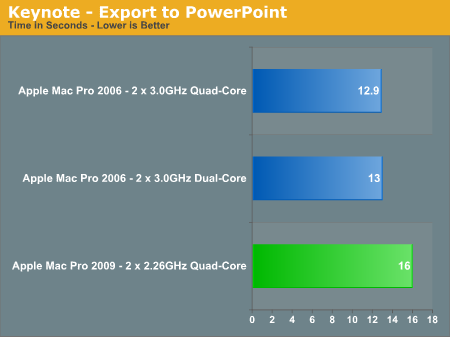
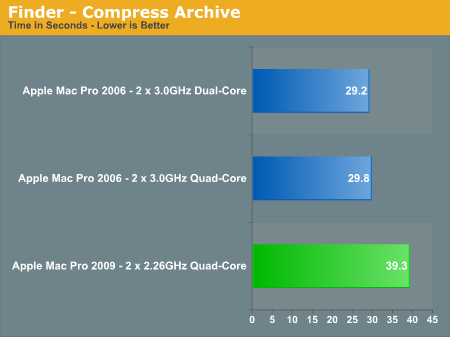
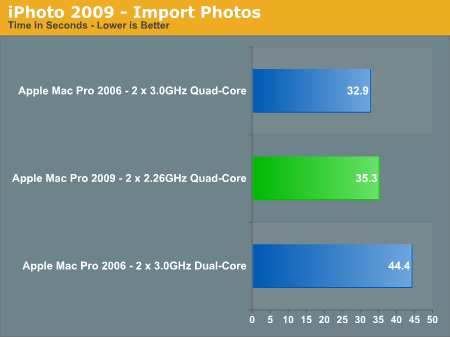










58 Comments
View All Comments
wackazong - Wednesday, September 9, 2009 - link
Hello,this may be the right place to ask: What's the difference between the Xeon and the (much cheaper) i7 processors? Couldn't you put an i7 into a Mac Pro?
sdevenshire - Saturday, August 29, 2009 - link
Hi,I purchased a 2xQuad core mac in Jan 2008 and I would like to upgrade the cpu to the new Nehalem. Apple suggested it could be done but they don't do it. I contacted a number of Mac repair places and they said it can't be done. I realize that upgrading the cpu probably means upgrading the motherboard, but that's fine with me.
Any suggestions on where I could get this done or where I might get instructions for doing it myself?
TIA,
Shane
529th - Thursday, July 30, 2009 - link
If you’ve read our Nehalem articles you’ll know that each chip has three 64-bit wide memory controllers, thus you’ll want to install DIMMs in triplets. You can install four DIMMs, but accessing memory in the fourth module will be slower - something you’ll never notice if you’re wondering. ???This is hindering me from buying a 4 channel UD3R X58 board. My main goal of an i7 build is for editing AVCHD files through Premiere Pro CS4. Being that tri channel will get me 6g and PP CS4 likes more memory, will adding memory to the 4th module screw things up?
newrigel - Tuesday, July 28, 2009 - link
Man, take your hackysack and go buy some laundry soap to clean the crap out of your drawers! You guy's talk about a couple thousand dollars like it's buying a damn house or some huge purchase LOL!Macs are really cost efficient and yes... PC's are cheaper but who gives a damn! If you want to be cheap... be cheap! Hackintoshes (LOL) are just that... a POS and your getting what you pay for! You cheap asses probably hit your ol' ladies up for gas money to get to work hehe...
MACS RULE!
ditchmagnet - Monday, July 27, 2009 - link
Just for fun I went to apples site and customized the mac pro, I just maxed out the hardware choices and then went to newegg and priced out an equivalent PC (Server board, with the same CPUs and everything except more RAM)Total for the apple including shipping and tax is over $20,000
the newegg build is under $9,000
I bet my 920 build at 4.5ghz is faster than the mac pro though, and all for under $1000
moltentofu - Tuesday, July 21, 2009 - link
wander over to the egg and buy a lian li. No flashy lights really, no idiot clear side panels. For some reason the hard drive access light and the power light are different colors on mine though.You can get a combo case with a seasonic 550W power supply with it. I put a phenom II x4 3.2Ghz 16 Gigs of RAM and a 1 Gig 4870 in there with aftermarket cooling all around (air not liquid) and it cost me 900 bucks - all from the egg.
If you think you're going to find performance arbitrage basically anywhere in the market you couldn't be wrong-er. Just pick your price/performance point and stick to it.
Thanks for the awesome reviews as usual Anand!
moltentofu - Tuesday, July 21, 2009 - link
With one big 'ol caveat to the arbitrage thing and that is: building your own system really does seem to be cheaper right now, and also I can't find component setups in the big name companies right now that make me quite happy.I miss when Dell Outlet used to be affordable. I'm afraid these Macs are just waaay out of range of my meagre salary.
fmaste - Monday, July 20, 2009 - link
Everybody talks about how expensive the Mac Pro is, but, has somebody compared with other brands? Look at this:I customize two Dell Precision Workstations with the same components as the base configurations Apple offers for the Mac Pro.
The results!!
Mac Pro Quad-Core: $2,499.00
Dell Precision T5500: $3,427
Mac Pro 8-Core: $3,299.00
Dell Precision T7500: $3,427
BOTH APPLE OFFERS ARE BETTER!!!!!
Both with the same processors, same amounts of memory at the same speed.
The only difference is instead of a NVIDIA GeForce GT 120 with 512MB you get a 256MB NVIDIA® Quadro® NVS 295. And that Dell options have hard drives with less capacity, 500GB vs 640GB. I also added the second Gigabit Ethernet card to both Dells. Dell has no bluetooth option and you may need to add a sound card to them.
Remember, you get a more expensive PC with windows Vista and an ugly chasis.
fmaste - Tuesday, July 21, 2009 - link
And here is HPMac Pro Quad-Core: $2,499.00
Same specs configurable HP Z800 Workstation: $3,942.00
Mac Pro 8-Core: $3,299.00
Same specs configurable HP Z800 Workstation: $3,702.00
excalibur3 - Friday, July 17, 2009 - link
So when you hypothetically created your i7 hackintosh, what were it's specs? I'm thinking about doing this (as a thought experiment only of course) and I'm wondering what such a system would price out. How would I know what motherboard to use to be compatible?